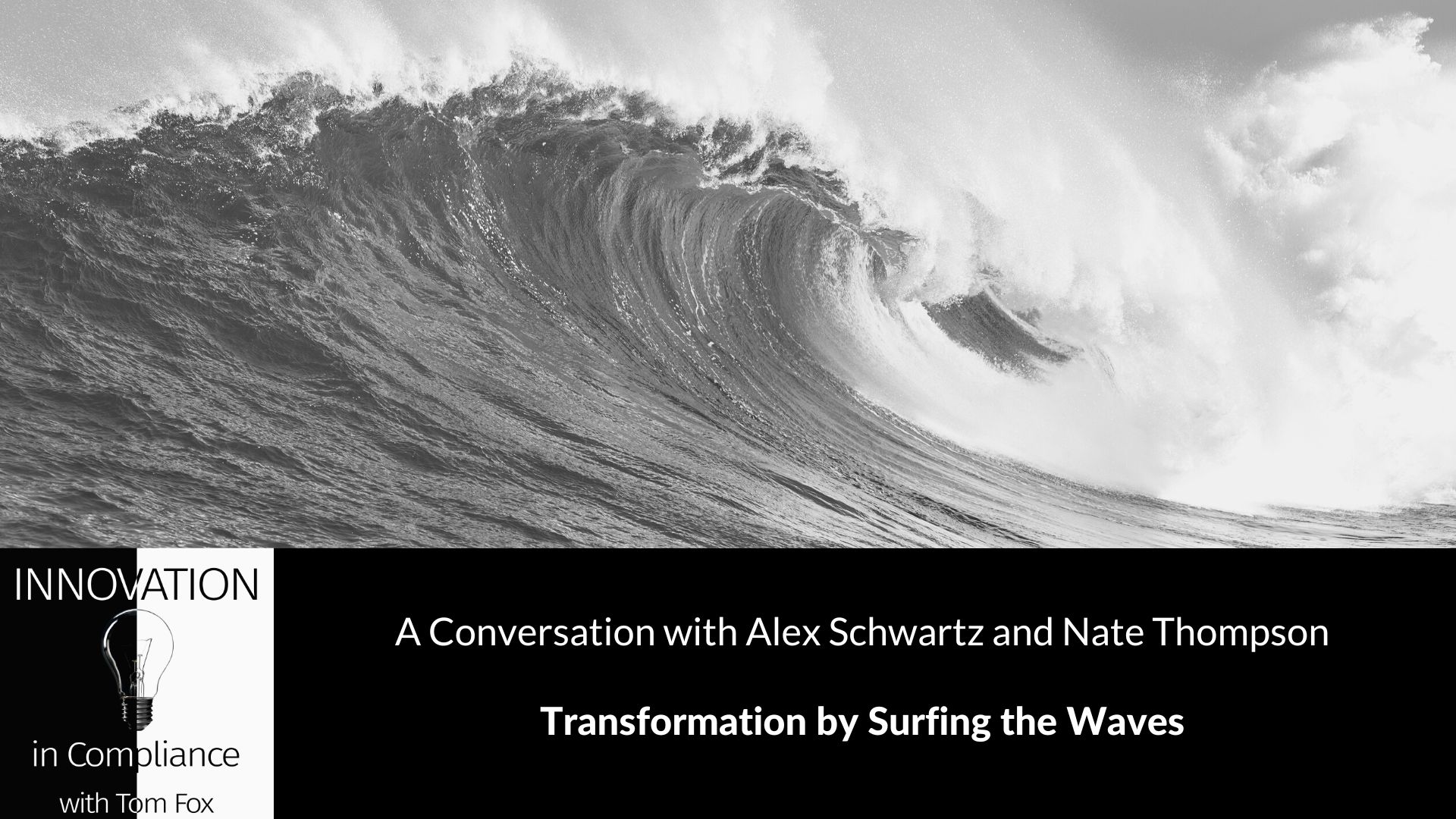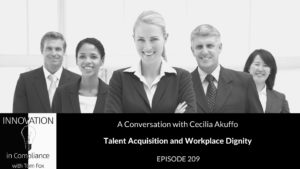
The traditional workplace as we know it is changing exponentially. This, accelerated by the COVID-19 pandemic, has forced companies to adapt to a new way of doing business. In this episode of Innovation In Compliance, Nate Thompson and Alex Schwartz, co-founders and hosts of The Disrupted Workforce, chat with host Tom Fox about the trends and challenges facing companies in this new era of work, including talent acquisition and retention, how AI will help identify talent pools, and the major shifts and disruptions happening in the workplace.
Alex Schwartz is a digital marketing and transformation solutions expert with over a decade of experience working with Fortune 500 companies. Prior to that, he worked in talent management in New York. Alex realized that there was a need to focus more on helping individuals navigate change and on creating better work cultures. He is passionate about looking at the future of work from a human-centered perspective.
Nate Thompson started his career as an engineer at Qualcomm. He ultimately left the technology space to focus on understanding organizational psychology and helping organizations reinvent themselves. Nate has spent the last 20 years specializing in organizational leadership and change. He went through a personal transformation after experiencing a “life crash”, which gave him the grit and resilience he needed to become a successful business leader. In March 2020, Nate and Alex launched their current platform.
You’ll hear Tom, Alex and Nate discuss these ideas in this episode:
- The world is changing rapidly due to various factors, including the pandemic. Nate tells Tom, “We are at the slowest period right now that we will ever be going forward. In other words, right now, today life is going really fast, and it’s only going to get faster, like significantly faster.”
- “The way that you’re even thinking about the world today has to start to evolve,” Nate remarks. The future of work mindset – as conceptualized by Alex and Nate – is crucial to navigate fast-paced change, and it’s based around the idea of exploring, expanding, and evolving.
- “The eleven days of clean audit health to failure [of the Silicon Valley Bank] really demonstrated to me the speed of which social media can bring change,” Tom remarks.
- “Sometimes leaders and organizations aren’t progressive, and they’re battening down the hatches and trying to weather the storm. The only problem is that strategy will not help in this dynamically unfolding world. You have to be able to surf the waves, not get washed over, crashed upon,” Nate says.
- Companies need to be proactive in building future of work programs, including creating talent mobility within the organization.
- Thoughtful and empathetic communication is crucial in handling layoffs, upskilling, and reskilling of the employee base.
- Talent acquisition and talent retention are among the most important issues for corporations in 2030 and beyond.
- There is a global job shortage and talent shortage in the United States.
- The focus of hiring is shifting from a skills and pedigree-based system to one more focused on how people learn because skills are changing so fast that how people learn and adapt can be more important than what degree or skill they have.
- There will be a more blended workforce where people are going to be wearing different hats and leaders and companies need to understand the needs of each worker to let them rise up and lead, even if they’re part-time.
- AI is changing the way recruitment works, unlocking talent pools that we never thought of.
- Alex and Nate use their podcast, The Disrupted Workforce, to share insights about the future of work, to amplify thought leaders’ voices, and to help people prepare, navigate, and thrive through these changing times.
KEY QUOTES
“We are at the slowest period right now that we will ever be going forward. In other words, right now, today life is going really fast, and it’s only going to get faster, like significantly faster.” – Nate Thompson
“…strategy will not help in this dynamically unfolding world. You have to be able to surf the waves, not get washed over, crashed upon.” – Nate Thompson
“We are moving from a skills and pedigree based hiring system, we believe, to one much more focused on how people learn. This is a fundamental shift that we are seeing because skills are changing so fast, that how you learn and how you adapt can actually be more important than what degree or skill you have. Because it’s quite possible that the job that you’re going to have in six months versus the one that you’re entering the door in hasn’t even been invented yet.” – Alex Schwartz
“If you ignore this, you will be kind of run over by these waves of disruption. We believe, and try to wake people up and really lead them through.” – Alex Schwartz
Resources:
Alex Schwartz on LinkedIn | Instagram
Nate Thompson on LinkedIn






